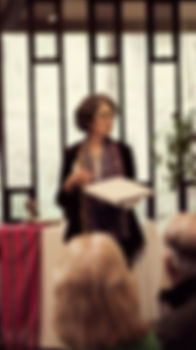St. Clare
ECUMENICAL CATHOLIC COMMUNITY

FREQUENTLY ASKED QUESTIONS
ABOUT MARRIAGE, DIVORCE & REMARRIAGE
We regard marriage as a sacrament. The ECC maintains that divorce is a tragic situation for all involved, but due to human imperfection, at times unavoidable. For many, divorce is one of the most painful and difficult times in their lives. We seek to reach out in compassion and healing to all concerned at this most difficult time. The ECC does not require an annulment in order to enter into a subsequent marriage. Those who have divorced and remarried are not excluded from the Eucharist or other sacraments.
Bishop Peter Hickman, has written a pastoral letter entitled Marriage & Remarriage In The Church Today. What follows are a few excerpts from this pastoral letter, to provide a flavor of the pastoral approach of the ECC in this difficult situation:
The school of marriage teaches valuable lessons which can be applied to all relationships in life. Sometimes that school provides hard lessons in the painful tragedy of divorce. Divorce is a major trauma for all who experience it, whether we speak of the spouses or the children of a family. . . St. Paul, in his epistle to the church at Rome, asks, "Who shall separate us from the love of Christ?" Too often, however, it is the church itself which provides the answer. At the precise time when we have been broken and made vulnerable by the experience of divorce, our misery is compounded by a sense of condemnation by our Christian church. It is not the healing voice of Jesus we hear, like the Samaritan woman at the well in John's gospel, but rather it is the voice and weight of law and the judgment of church leaders which confront us and add to our grief . . .
It is apparent that those who have divorced and remarried are still in need of the sacramental life of the Church. We join our Eastern Christian brothers and sisters in an ancient tradition of supporting those who have remarried by counseling them to reflect upon all that has passed and to grow in all that will come during their new marriage. Such growth can only be successful in union with the sacramental life of the Church and in the Church's teaching on the life of prayer and the excellent way of love as taught in the Holy Scriptures and practiced by faithful families.
To read the letter in its entirety, click here

ABOUT SAME GENDER RELATIONSHIP
St. Clare is an open and affirming community, as the ECC is an open and affirming Communion. We recognize the value and dignity of every person, in our God given diversity.
We promote the education and development of the people of God in our understanding of the natural diversity of sexual orientation among our brothers and sisters. All sexual relationships are to be guided by the Christian moral principals of love and fidelity. The ECC upholds the ideal of committed relationships blessed by the sacred rites of the church.
We joyfully celebrate legal marriage ceremonies with same gender couples.
We believe that all questions of sexual morality are best addressed through pastoral care and counsel. Within the ECC, all are welcome!
Bishop Peter Hickman, has written a pastoral letter entitled Human Sexuality: The Sacred Body. What follows are a few excerpts from this pastoral letter, to provide a flavor of the pastoral approach of the ECC in this situation.
. . . We regard the teaching of Jesus, and of the whole New Testament, as overpoweringly in favor of love of neighbor and concern for the welfare of others. We recognize that in the past whole groups of people, gay and lesbian persons among others, were often compelled to give up personal well being (or even to suffer) on behalf of supposed moral principles. The arguments that led to such sacrifice are not consistent with the gospel of Christ. Therefore, the Christian community must acknowledge that gay and lesbian persons should be accorded the same dignity and freedom that is the gift of our Creator. . . The community of faith continues to develop its understanding of the truth that the love of God is present in all creation and therefore in every human being irrespective of race, gender or sexual orientation. Love is measured by the fruit of the Spirit which is love, joy, peace, patience, kindness, generosity, faithfulness, gentleness, and self-control. Against such things there is no law. (Galatians 5: 22-23). The moral issue for Christians is not whether love is homosexual or heterosexual, or on a continuum between these two. The moral issue is the extent to which love is characterized by the fruits of the Spirit. This applies to all people, whatever their sexual orientation . . . We joyfully welcome gay and lesbian individuals and couples fully into our faith community. We have been graced by their presence among us, have seen the fruits of the Spirit in their lives, and have witnessed their dedication to a life of faith and faithfulness. . . We offer gay and lesbian couples the support given to others in our community. We embrace these couples, welcome them into the household of faith and provide a context in which to live out the Christian ideal of love, fidelity and commitment to one another. In order to strengthen their shared life together in Christ we offer, to those who desire it, the graces of a holy union blessed by the Church.
To read full letter of Human Sexuality, click here

ABOUT BIRTH CONTROL
St. Clare, and the ECC, affirm the basic human right of freedom of self determination, particularly in matters of conscience. As a consequence, we believe that all adults have the right and responsibility to follow their informed consciences in all matters, and thereby have the right and responsibility to: a) determine in conscience the size of their families; and, b) determine in conscience appropriate methods of family planning. Matters of contraception and artificial birth control as a way of responsibly limiting the size of one's family are issues of conscience to be decided by couples. Contraception and artificial birth control, when used responsibly, can be positive goods as a means of increasing the frequency of the gift of sexual union, reducing the incidence of abortion for unwanted pregnancies and limiting the spread of sexually transmitted disease.

DO ST. CLARE AND ECC SUPPORT THE ORDINATION OF WOMEN?
Absolutely!
Evidence from early church history indicates that women were ordained as deacons and priests at least through the first four centuries of Christianity.
There is also some evidence that there were women bishops. In the ECC, women are encouraged to respond to a genuine call to serve and to participate in all levels of ministry - lay or ordained. Women are not excluded from ordained ministry (deacon, priest or bishop) based upon their gender. Currently in the ECC there are a number of women priests and deacons; and we look forward to the day when one of our women clergy will be called to serve us as bishop.
As St. Paul writes: "...there is neither Jew nor Greek, slave nor free, male nor female; all are one in Christ Jesus."

ARE ECC PRIESTS REQUIRE TO BE CELIBATE?
No, ECC priests (male or female) are not required to be celibate.
Evidence from scripture and early church history suggest that many of the apostles and early church leaders were married. Clerical celibacy, although optionally practiced, was not a requirement in the Roman Catholic church until 1274.
It was enforced at that time for relatively practical reasons, primarily to protect the church from the threat of hereditary/inheritance claims by the children of deceased clergy.
Prior to this, many Roman Catholic priests, bishops and popes were married. Clerical celibacy has never been required in the eastern orthodox or other apostolic churches (e.g., Lutheran, Methodist, Episcopal, Presbyterian, etc.)
The ECC follows the teachings of Jesus, the first 1300 years of Christian tradition, and the continuing experience of most major Christian denominations in allowing individuals to respond to God's call to ordained ministry freely; therefore, the ECC believes that marriage and ordination are not mutually exclusive.
